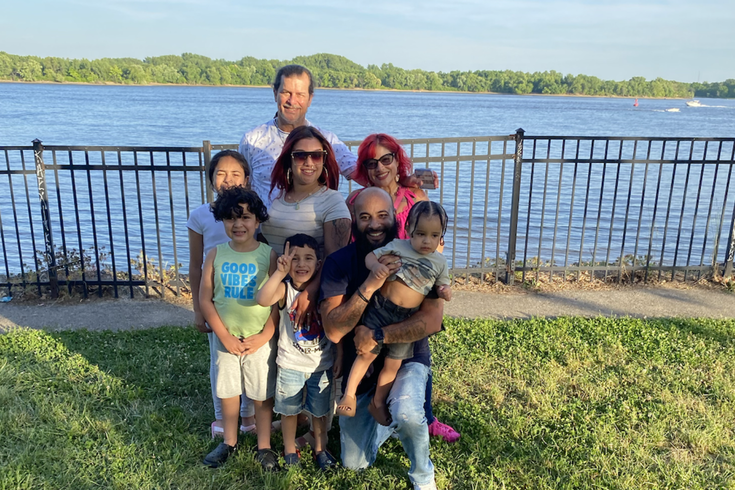
August 01, 2024
 Provided Image/Martin Rivera
Provided Image/Martin Rivera
Martin Rivera, 33, on his knee, poses with his five children and other family members. He says the program Focus on Fathers helped how to be a more present and communicative parent.
Martin Rivera's father was incarcerated for the first seven years of Rivera's life, so his mother was the one who nurtured him and his four siblings, Rivera said.
"She made sure we always went to the park, made sure we went to the zoo, made sure we were at the swimming pools in the summertime," Rivera said. "She was always active when she wasn't at work. And I'm like, 'Did you ever have time to sleep?' She's like, 'I napped. I didn't sleep.'"
But when Rivera, who grew up in Philadelphia, became a parent at 19, he found himself following his father's parenting style.
"He's the one who really instilled that tough love and low love, like 'I'm your father, you're going to love me. You have to respect me. You have to listen to me,'" Rivera said. "And that's where a lot of my early teachings on parenting came from."
It wasn't until Rivera got caught up in the criminal justice system, and a judge referred him to a parenting class, that Rivera had a "coming to moment," he said. He heard other men in the class telling him, "When it comes to your children, stop giving them the tough love that you were given and give them the love that you wanted."
Now 33 and the father of five, Rivera works for the same parenting program he attended, Focus on Fathers. It tries to help dads develop and maintain positive, healthy involvement in their children's lives. Focus on Fathers has roots in a larger movement to promote men's emotional development and reduce domestic violence and absentee fatherhood. An affiliate of the Philadelphia-based nonprofit Public Health Management Corporation, Focus on Fathers is also part of a criminal justice effort to reduce recidivism through resource-based sentencing and supervision.
Realizing that "judges are set up to be the executioner," that "they're not set up to be helpful at all," Judge Stephanie Sawyer in Philadelphia's Court of Common Pleas is a proponent of resource-based sentencing and supervision and ultimately founded a nonprofit called The Sentencing Foundation. Resource-based sentencing engages defendants with judges in comprehensive plans that involve community programs, such as Focus on Fathers, to try to address behaviors and heal wounds that led to court involvement.
"We are in the business of passing out boots and requiring people to pull them up," said Sawyer, who ran her own law office in Center City for two decades before becoming a judge in 2014.
When Sawyer refers defendants to Focus on Fathers, they sometimes say, "'I'm a good parent,'" Sawyer said. "And so I say to them, 'Respectfully, ma'am, sir, what am I talking to? You just spent eight months in jail, or 12 months in jail, or you've been in and out of jail for the last 20 years. Don't you think your children are watching you? Don't you think you need some professional supports to understand what trauma you are giving to your child and what tools you need to reunify yourself in a healthy way?"
Serving more than 250 people a year, Focus on Fathers uses a curriculum called 24/7 Dad that addresses topics such as what it means to be a father and how to show and handle feelings. Case managers also help those in the program with job readiness, financial counseling and other services. The program lasts 13 sessions and is available at multiple locations in the city.
"With a lot of guys, it's like, 'Well, I buy them sneakers once a year,'" said Larry Woody, Focus on Father's program manager. "That's not it, brother. I mean, that's a nice thing. I'm glad you do that. But it's much more about consistency.'
"Women carry the baby, but after that, you're pretty much on even ground," Woody added. "The nurturing piece you can learn. Moms are learning as well."
The program also emphasizes that the father learns how to "do business" with his child's mother, no matter what their current relationship is, Woody said.
Often fathers think that it's an "option" to be a parent, Rivera said. "But that child didn't ask to come here, right? You and the mother came together and brought that child into this world. So just like it's not an option for mother, it's not an option for father."
Sometimes the fathers he encounters "kind of want permission" to parent, and "they need to be shown how to get there," Woody said.
Rivera said the program helped him learn how to be present with his children, how to listen to them, have conversations with them and more fully participate in their lives.
"Sometimes we as men need to get out of our own way," Rivera said. "And getting out of our own way is, no matter what differences we have with the mother, no matter what differences we have with time loss – time loss is never lost, because as long as you have a fight and love for your child, there's always a chance."